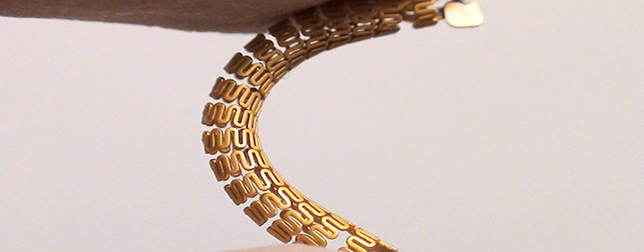Vascular stents are common metal or plastic tubes inserted into the arteries to keep the passageway open, allowing uninterrupted blood flow. However, for every three people who have had a stent implanted to keep clogged arteries open and prevent a heart attack, at least one will experience restenosis – the recurrence of plaque buildup causing the artery to narrow – which can lead to additional complications.
Read more iBeat Announces New Funding for Wearable Heart Watch
Now, Researchers at the University of British Columbia (UBC) have developed a “smart stent” that’s equipped with a built-in sensor for measuring blood flow and a radio antenna to send the data to an external device. The stent can monitor even subtle changes in the blood flow and detect narrowing in its earliest stages allowing early diagnosis and making treatment easier.
The technology doesn’t require any changes in implantation procedures and should be applicable to be integrated into existing stents.
The research team is led by Kenichi Takahata, professor of electrical and computer engineering at UBC. “We modified a stent to function as a miniature antenna and added a special micro-sensor that we developed to continuously track blood flow. The data can then be sent wirelessly to an external reader, providing constantly updated information on the artery’s condition,” said Takahata.
The “smart stent” which looks like most commercial stents uses medical-grade stainless steel. This is the first angioplasty-ready smart stent and it can be implanted using current medical procedures without requiring any modifications, according to the researchers.
Dr. York Hsiang, professor of surgery at UBC and vascular surgeon at Vancouver General Hospital collaborated in the study. He said that monitoring for restenosis is critical in managing heart disease.
“X-rays such as CT or diagnostic angiograms, which are the standard tools for diagnosis, can be impractical or inconvenient for the patient,” said Hsiang. “Putting a smart stent in place of a standard one can enable physicians to monitor their patient’s health more easily and offer treatment, if needed, in a timely manner.”
Read more Smart Pills Will Change the Way We Take Medications
The team successfully tested the device prototype in laboratory pigs.
Takahata, who holds patents for the technology, says he and his team are planning to seek industry partnerships to further improve the device, put it through clinical trials and eventually make it available commercially.
Engineering researcher Xing Chen, now a research associate at the Johns Hopkins School of Medicine, and Babak Assadsangabi, a postdoctoral fellow at UBC’s faculty of applied science, also contributed to the study, which was published in the journal Advance Science.













